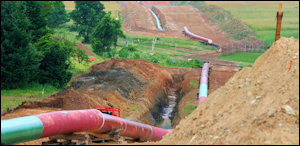Governor Terry McAuliffe is getting heat from his far left flank for endorsing the construction of natural gas pipelines in Virginia, supporting offshore drilling and supporting Dominion Virginia Power’s plans for disposing of coal ash. While crediting McAuliffe for “small steps” in supporting solar power, energy efficiency and coastline resiliency in the face of rising sea levels, a coalition of mostly left-leaning environmentalists is calling for stronger measures.
“On the biggest, most polluting issues of our time, the Governor simply has not shown he has heard the voices of affected communities or joined the growing statewide call for justice,” states an open letter signed by more than sixty environmental, social justice and property rights groups.
Notably absent from the signatories were mainstream environmental organizations such as the Southern Environmental Law Center, the Sierra Club and the National Resources Defense Council. The mainstream groups support the same positions but have worked within the system by lobbying, filing lawsuits and participating in gubernatorial stakeholder groups.
The McAuliffe administration responded forcefully with a defense of the governor’s record on clean energy, solar power, water quality and preparing for climate change. “The governor recognizes that clean energy is the lifeblood of the new Virginia economy, and a majority of Virginians support his work to create jobs while protecting the natural resources that are so important to the commonwealth’s quality of life,” spokesman Christina Nuckols told the Richmond Times-Dispatch.
Arrayed against the environmental and social justice activists are a coalition of manufacturers, chambers of commerce, labor unions and economic development groups that support the pipeline. These groups have been far less active and less visible.
Specifically, the open letter calls for McAuliffe to:
- Discontinue his support of offshore drilling.
- Reconsider his support for the Atlantic Coast Pipeline and Mountain Valley Pipeline, and use his legal authority to review and challenge water permits under the Clean Water Act.
- Immediately stop the plans of Dominion Virginia Power and other companies to “dump millions of additional tons of toxic coal ash liquid” into Virginia rivers or to otherwise improperly store the ash.
- Support strong policy solutions to combat coastal flooding while capping carbon pollution.
- Commit to a “mass-based” plan under the Clean Power Plan that would set stricter limits on CO2 emissions from electric power plants and “create thousands of new renewable energy jobs.”
Casting itself as a “multi-generational, multi-racial, multi-regional” movement for social change, the group is organizing a “march on the mansion” in Richmond on July 23.
Bacon’s bottom line: As a moderate Democrat, McAuliffe walks a fine line between his number one priority, creating jobs, and supporting environmentalists’ goals. While the mainstream environmental groups push their agenda from the inside — former SELC attorney Angela Navarro now works as Deputy Secretary of Natural Resources, for instance — the activist groups are pushing from the outside.
McAuliffe has supported the Obama administration’s Clean Power Plan to curtail CO2 emissions, implicated in global warming, but he has not yet committed to any of the four broad options available to states for meeting the federal goals. The “mass-based” plan favored by environmentalists, critics argue, would cost ratepayers billions of dollars.
The governor also has supported the pipeline projects, arguing that greater use of natural gas would allow Virginia to transition away from coal, reduce CO2 emissions, and compete for industry that uses natural gas as a feedstock or energy source. The pipelines have stirred up a hornet’s nest of opposition among Virginia mountain communities along the route, where people fear, among other things, that construction and operation of the pipelines will cause erosion that releases sediment into streams, rivers and water supplies. They argue that the regulatory apparatus, divided between the Federal Energy Regulatory Commission and DEQ, is broken. In particular, they fear that DEQ is being constrained by pressure from the governor’s office to not move more aggressively to regulate the impact of the pipelines upon water quality.
The coal ash issue has been contentious, too. While DEQ has issued Dominion permits for treating and disposing of the water in coal ash ponds, it has not yet issued permits for disposing of the mineral residue itself. Environmentalists want to put the material into lined landfills to prevent any possibility of groundwater contamination. Dominion says that option could cost $3 billion, which would be passed on to rate payers. The McAuliffe administration has not indicated which way it leans.



